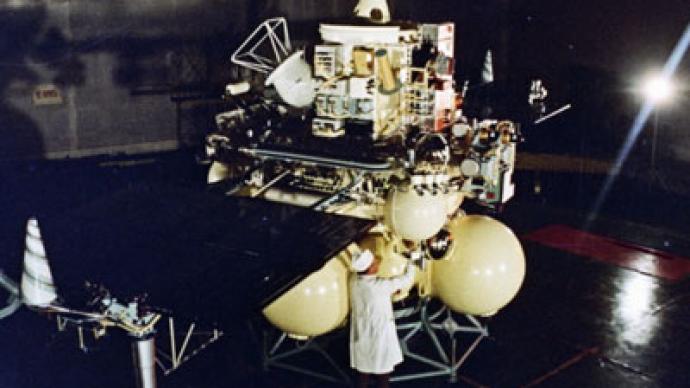Living dead: Mars probe hopes diminishing

Chances of reviving an unresponsive Russian space probe headed for a moon of the Red Planet are now virtually zero. Hopelessly off-course, it is apparently doomed to fall back to Earth, though it is not clear when or where.
Fixing the Phobos-Grunt and putting it back on track is now impossible. The probe will not be able to carry out its mission – to land on Phobos and take a sample of its soil back to Earth.“This would be possible if Phobos-Grunt received a new flight program, which would involve acceleration with the use of complex ballistic maneuvers, for instance, through the Moon and with high fuel expenditure. But by mid-December, even this opportunity to fire the spacecraft towards Mars will be gone,” a source in the space industry told Interfax.Besides an unfeasibly powerful impulse from its engine, putting the probe back on track would require two-way communication, impossible ever since its botched launch on November 9. The Phobos-Grunt was taken to intermediary orbit by a Zenit rocket, but its engine failed to fire to proceed with the mission.Russian space agency Roscosmos says the most likely cause of the failure was a glitch in the stellar orientation instruments, which had to position the spacecraft correctly in order for the engine to start. Engineers wanted to reprogram the probe in orbit, but could not get the necessary data from it.Observations showed that the Phobos-Grunt managed to unfold its solar batteries, which meant its instruments had power supply and would work longer than the three days, which the probe’s batteries will have lasted. It also has variable orbit, indicating that it established its orientation in relation to the Sun, and uses maneuver engines to maintain it.With no way to either reboot its systems or upload a new program, the Martian moon probe is doomed to fall back to Earth. Its distance from Earth is already decreasing, with the furthest point of its orbit falling from 342 to 331.8 kilometers over the week following the launch. When the lowest point of orbit, currently about 200 kilometers from Earth, decreases to 180 kilometers, the drag of the Earth’s atmosphere will quickly slow the probe and bring it down. Roscosmos expects this to happen in early January. However embarrassing for the Russian space industry, the re-entry will not pose any danger, the agency’s head Vladimir Popovkin says. Most parts of the probe, including the highly toxic fuel, will simply burn down.“The return capsule will not burn – it will reach Earth, because that’s what it was intended for. Some durable parts of the engine, combustion chambers may, as well. That’s all,” an industry expert explained to RIA Novosti.The location of the future impact is too early to predict. Chances are high that the remains of the probe will never be found, the expert added. If re-entry were done in a controlled manner, the spacecraft would transmit the exact parameters on its way down, and even with those, the search area would have been three kilometers wide. The way it will happen, the area will be hundreds of kilometers across, and finding a 20-centimeter ball will be nigh on impossible.When the Phobos-Grunt is destroyed, there will be no way to establish for sure the causes of its failure, some experts say. This is part of the reason why the probe’s loss has not yet been officially announced.“Everyone understands that the spacecraft is lost. But if this is officially confirmed, specialists will have to stop trying to salvage at least some info from it, to shed light on the malfunction,” a source commented for Interfax.Earlier, independent space experts accused Roscosmos and the NPO Lavochkin, which designed and built the Phobos-Grunt, of taking too great a risk with an under-tested vehicle. Russian space bloggers are speculating that the decision to launch the probe was taken under political pressure ahead of the country’s parliamentary election. They also believe that any effort to regain control over the spacecraft was doomed, because designers didn’t provide such an option in the first place.An official investigation is underway into the failure, which has ruined Russia’s chances of continuing exploration of Mars, after a 25-year delay.














